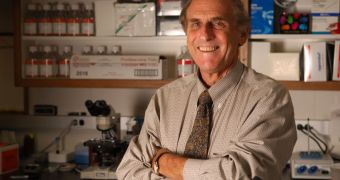The Board of the Nobel Foundation has decided that Ralph M. Steinman will still be awarded half of the 2011 Nobel Prize in Physiology and Medicine. He died the day the winners for this year were announced, and the Nobel Prize cannot be awarded posthumously. Yet, the Board made its decision.
Steinman died of pancreatic cancer at the age of 65 on Friday, September 30, just three days before the Nobel Committee attempted to contact him to inform him that he won half of this year's famous prize
Based at the Rockefeller University in New York since 1970, the scientist was working on a vaccine against human cancer for well over 20 years. He was treating his own condition with a treatment of his own doing, which enabled him to endure the onset of pancreatic cancer for four years.
Only 4 percent of people suffering from this aggressive type of cancer live five years after detection, primarily because the tumors can only be found once they began spreading throughout the body.
When the president of the Rockefeller University, Marc Tessier-Lavigne, was called by one of Steinman's daughters and informed of his death, he called the chairman of the Nobel Prize Committee.
The Board of the Nobel Foundation convened immediately, in order to argue whether they should uphold the initial decision made by the Nobel Assembly at Karolinska Institutet or not.
The timing of when the 2011 winners were announced was key in the decision. The Committee was informed of the researcher's death on October 3, at 1430 CET. But officials with the Foundation had already announced the winners earlier that day, at 1130 CET.
“The events that have occurred are unique and, to the best of our knowledge, are unprecedented in the history of the Nobel Prize. In light of this, the Board of the Nobel Foundation has held a meeting this afternoon,” an official press release from the Nobel Foundation said on Monday.
“According to the statutes of the Nobel Foundation, work produced by a person since deceased shall not be given an award. However, the statutes specify that if a person has been awarded a prize and has died before receiving it, the prize may be presented,” the document adds.
According to the way the Board interpreted the status of the Nobel Prize, the award cannot be awarded posthumously in a deliberate manner, as in if the officials know the researcher they are trying to honor is dead. But, in this particular case, everyone acted in good faith.
“The Nobel Foundation thus believes that what has occurred is more reminiscent of the example in the statutes concerning a person who has been named as a Nobel Laureate and has died before the actual Nobel Prize Award Ceremony,” the statement says.
Steinman shared the 2011 Nobel Prize in Physiology and Medicine with expert Bruce A. Beutler and Jules A. Hoffmann, who jointly won the other half of the award. All three scientists were conducting investigations into the way the human immune system works.

 14 DAY TRIAL //
14 DAY TRIAL //